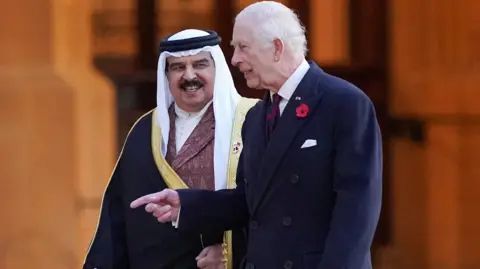Bahrain activists criticise UK over King Hamad's honorary knighthood
 Reuters
ReutersHuman rights activists have criticised an honorary knighthood given to King Hamad bin Isa Al Khalifa of Bahrain, who visited the UK earlier this week.
In a letter to Buckingham Palace, three Bahraini activists now living in exile called on King Charles to rescind the Grand Cross of the Royal Victorian Order, describing the award as a “betrayal".
They cited what they called the “arbitrary imprisonment, brutal torture, unfair trials, and arbitrary executions of innocent individuals".
A spokesman for Bahrain's government said it "firmly rejects these baseless claims which overlook the substantial progress the Kingdom has achieved in advancing individual rights and the rule of law".
"We remain committed to continued reforms and welcome constructive dialogue to address any legitimate concerns fairly and transparently," they added.
Amnesty International and Human Rights Watch have both also expressed concern.
“You have to wonder what signal this sends when the Bahraini authorities are unjustly prosecuting their critics, when human rights defenders are languishing in Bahraini jails and when the Manama authorities refuse to reinstate the citizenship of people rendered stateless on politically motivated charges,” said Allan Hogarth, Amnesty International UK’s head of government and political relations.
The award given to King Hamad as well as King Abdullah of Jordan – who are both marking silver jubilees this year – was announced on Wednesday by Buckingham Palace.
It is not commenting on the criticism.
Bahrain and the UK have strong diplomatic, political and military relations.
On Monday, King Hamad arrived in a horse and carriage at Windsor Castle, receiving a Royal Salute from a Guard of Honour.
A “spectacular evening” followed which ended with pipers marching around the dinner table, according to the British ambassador to Bahrain, Alastair Long, on Instagram.
He said that King Charles, addressing the Bahraini monarch, had praised him for being “guided by his concern and care for his people.”
King Hamad, a Sunni Muslim, rules a country with a Shia majority, and members of his family hold the main political and military positions.
In 2011, pro-democracy protests were crushed, with the help of troops from Saudi Arabia and the United Arab Emirates.
Earlier this year, hundreds of political prisoners were freed after they were granted a royal pardon to mark 25 years of King Hamad’s rule.
But many remain in jail, including human rights activist Abdulhadi Al-Khawaja, 63, and 76-year-old opposition leader Hassan Mushaima, the fathers of two of the signatories to the letter to King Charles - Maryam Al-Khawaja and Ali Mushaima.
The third signatory, Sayed Ahmed Alwadaei - who is now a British citizen - said he had been beaten, tortured and jailed for calling for peaceful change.
“Throughout King Hamad’s rule, scores of Bahrainis have been arbitrarily detained and tortured, and some have even been killed as a result of exercising their rights to assembly and free expression,” Niku Jafarnia of Human Rights Watch told the BBC.
“The recent pardons he’s given don’t make up for these abuses, and it’s a disgrace that he has been granted this award while many still remain wrongfully detained,” she said.
